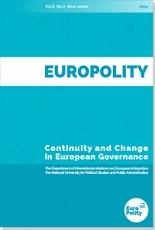REFLECTIONS ON ROMANIA’S ROLE CONCEPTION IN NATIONAL STRATEGIC DOCUMENTS 1990-2014: AN EVOLVING SECURITY UNDERSTANDING
REFLECTIONS ON ROMANIA’S ROLE CONCEPTION IN NATIONAL STRATEGIC DOCUMENTS 1990-2014: AN EVOLVING SECURITY UNDERSTANDING
Author(s): Iulia-Sabina JojaSubject(s): Politics / Political Sciences
Published by: Scoala Nationala de Studii Politice si Administrative (SNSPA)
Keywords: Euro-Atlantic integration; Role conception; Romanian foreign and security policy; Strategic culture; Transformation
Summary/Abstract: Romania‘s role conception is depicted in the series of national security and defence strategies formulated during its post-communist era. These strategic documents represent the vision of the country‘s Presidential Administration regarding foreign and security policy‘s main directions and, if adopted by Parliament, the national vision on foreign and security policy. The purpose of this study is to provide an analysis of Romania‘s role conception through the comparative case study of three of these national strategies, showing that while the stages of transition undergone by Romania in terms of foreign and security policy have had in some respects a manifold impact upon its security discourse and its strategic culture, some elements of strategic culture have remained constant despite important external shocks. Romania has maintained its role conception as a balancer in the region and its security rationale focused on Russia. The integration into the Euro-Atlantic community has led, on the other side, to an accentuated and constant Atlanticism as a main feature of Romanian security policy, as well as to a newly found assertiveness. However, this (re)discovered assertiveness has not led to consensus in terms of foreign and policy prioritisation, but to a current foreign policy based on the search for a new paradigm.
Journal: Europolity - Continuity and Change in European Governance
- Issue Year: 9/2015
- Issue No: 1
- Page Range: 89-111
- Page Count: 23

